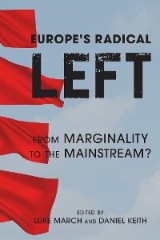Details

Europe's Radical Left
From Marginality to the Mainstream?|
48,99 € |
|
| Verlag: | Rowman & Littlefield International |
| Format: | EPUB |
| Veröffentl.: | 20.10.2016 |
| ISBN/EAN: | 9781783485376 |
| Sprache: | englisch |
| Anzahl Seiten: | 466 |
DRM-geschütztes eBook, Sie benötigen z.B. Adobe Digital Editions und eine Adobe ID zum Lesen.
Beschreibungen
<span><span>Although the most pernicious consequences of the crisis have apparently abated, the long-term political repercussions remain unclear. Whereas most attention has focused on the right-wing populist parties, the rejuvenation of the left is an unwritten story of post-crisis politics. </span></span>
<br>
<br>
<span><span>This volume addresses this story, with three principal aims:</span></span>
<br>
<ul>
<li><span>to examine the radical left intellectual response to the crisis, i.e. how actors conceptualise the causes of crisis and its consequences; </span></li>
<li><span>to examine the radical left electoral response to the crisis, i.e. how the crisis has aided or weakened the electoral success of radical left parties and movements; </span></li>
<li><span>to examine organisational responses, i.e. whether the crisis has resulted in new party structures, methods of organising, and internal party tendencies. </span></li>
</ul>
<span><span>The result is a comprehensive compendium, drawing on cutting-edge research from leading European experts to present the first comparative analysis of how the far left of the political spectrum has responded to the crisis. It furthers our understanding both of the dynamics of European party systems and the wider consequences of the Great Recession. </span></span>
<br>
<br>
<span><span>This volume addresses this story, with three principal aims:</span></span>
<br>
<ul>
<li><span>to examine the radical left intellectual response to the crisis, i.e. how actors conceptualise the causes of crisis and its consequences; </span></li>
<li><span>to examine the radical left electoral response to the crisis, i.e. how the crisis has aided or weakened the electoral success of radical left parties and movements; </span></li>
<li><span>to examine organisational responses, i.e. whether the crisis has resulted in new party structures, methods of organising, and internal party tendencies. </span></li>
</ul>
<span><span>The result is a comprehensive compendium, drawing on cutting-edge research from leading European experts to present the first comparative analysis of how the far left of the political spectrum has responded to the crisis. It furthers our understanding both of the dynamics of European party systems and the wider consequences of the Great Recession. </span></span>
<span><span>Compiles contributions from leading scholars to analyse how European radical left parties have responded to the ongoing socio-economic crisis that continues to afflict the EU.</span></span>
<span><span>1. Introduction, Daniel Keith and Luke March / PART I: THE INTERNATIONAL ECONOMIC CRISIS AND THE CRISIS OF THE LEFT / 2. Radical left ‘success’ before and after the Great Recession: still waiting for the Great Leap Forward?, Luke March / 3. Capitalist crisis or crisis of capitalism? How the radical left conceptualises the crisis, David J. Bailey / 4. Uplifting the masses? Radical left parties and social movements during the crisis, Óscar García Agustín and Martin Bak Jørgensen / 5. The Radical left and immigration: resilient or acquiescent in the face of the radical right?, Francis McGowan and Daniel Keith / PART II: NATIONAL RESPONSES TO CRISIS / 6. The French radical left and the crisis: ‘business as usual’ rather than ‘le Grand Soir’?, Fabien Escalona and Mathieu Vieira / 7. Ideological confirmation and party consolidation: Germany’s Die Linke and the financial and refugee crises, Amieke Bouma / 8. Failing to capitalise on the crisis: the Dutch Socialist Party, Daniel Keith / 9. The Icelandic Left-Green Movement from victory to defeat, Silja Bára Ómarsdóttir and Andrés Ingi Jónsson / 10. Struggling for coherence: Irish radical left and nationalist responses to the austerity crisis, Richard Dunphy / 11. Czech Communists and the crisis: between radical alternative and pragmatic Europeanization, Vladimír Handl and Andreas Goffin / 12. Latvia’s ‘Russian left’: trapped between ethnic, socialist, and social-democratic identities, Ammon Cheskin and Luke March / 13. The Portuguese radical left and the Great Recession: old challenges and new responses, André Freire and Marco Lisi / 14. The Left and the crisis in Cyprus: ‘In the midst of change they do not change’, Giorgos Charalambous and Gregoris Ioannou / 15. Greek radical left responses to the crisis: three types of political mobilisation, one winner, Costas Eleftheriou / 16. Riders on the storm: United Left and Podemos during the 2008 Great Recession, Luis Ramiro / PART III: TOWARDS AN INTERNATIONAL RESPONSE? / 17. To EU or not to EU? The transnational radical left and the crisis, Michael Holmes and Simon Lightfoot / 18. Conclusion. The European radical left: past, present, no future?, Daniel Keith and Luke March</span></span>
<span><span>Luke March is Professor of Post-Soviet and Comparative Politics at the University of Edinburgh. He is author of </span><span>The Communist Party in Post-Soviet Russia</span><span> (Manchester University Press, 2002), </span><span>Radical Left Parties in Europe</span><span> (Routledge, 2011) and </span><span>The European Left Party: A Case Study in Transnational Party Building</span><span>, with Richard Dunphy, (Manchester University Press, 2015).<br><br>Daniel Keith is Lecturer in the Department of Politics at the University of York. He wrote his doctoral thesis on the role of organisational factors in shaping the diverse programmatic adaptation of West European Communist parties and their successor parties. He has published articles on the Portuguese Communist Party and the Socialist Party and Green Left in the Netherlands.</span></span>

















